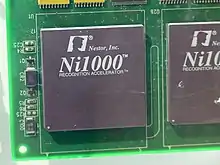Ni1000
The Ni1000 is an artificial neural network chip developed by Nestor Corporation and Intel. It is Intel's second-generation neural network chip but first all digital. The chip is aimed at image analysis applications, contains more than 3 million transistors and can analyze patterns at the rate of 40,000 per second.[1] Prototypes running with Nestor's OCR software in 1994 were capable of recognizing around 100 handwritten characters per second. The development was funded with money from DARPA and Office of Naval Research.[2]

Add-in board with Intel/Nestor Ni1000
References
- Baran, Nicholas (March 1994). "Intel and Nestor to Commercialize Neural-Net Chip". Byte. Archived from the original on 1996-12-21. Retrieved 21 October 2022.
- "Intel's Ni1000 chip holds prospect of commercial neural networks". CBROnline archive at techmonitor.ai. 21 February 1993. Retrieved 14 May 2021.
- Intel/Nestor Ni1000 Recognition Accelerator Technical Specification
- Perrone, Michael P.; Cooper, Leon N. (1995). "The Ni1000: High Speed Parallel VLSI for Implementing Multilayer Perceptrons". In Leen, Todd K.; Tesauro, Gerald; Touretzky, David S. (eds.). Advances in Neural Information Processing Systems 7 (PDF). pp. 747–754. ISBN 9780262201049. Retrieved 21 October 2022.
This article is issued from Wikipedia. The text is licensed under Creative Commons - Attribution - Sharealike. Additional terms may apply for the media files.